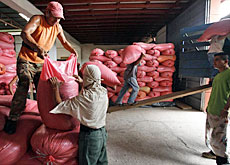Natural resources still being wasted

The Swiss are consuming natural resources as if there were no tomorrow, according to the latest national report on sustainable development.
While the idea of safeguarding the world for a better future seems to be making inroads, the Swiss are still behaving as if there were three planets available.
Published this week by the Federal Statistics Office, the report shows that Switzerland’s so-called ecological footprint – the surface necessary to sustain levels of resource consumption and waste discharge by the population – is equivalent to 4.7 hectares per person.
Worldwide there are only 1.8 hectares available per person, meaning the Swiss are using other people’s resources or those of future generations. The current global average is 2.2 hectares.
The main reason for the bad Swiss scorecard is energy use: it is ten times what it was in 1961.
Yet Switzerland is not unusual among its European Union neighbours. Industrialised nations use on average three times more resources than they should be allowed to.
“If you look at figures, there is no way you can say the Swiss are contributing to sustainable development,” said Peter Knoepfel of the Swiss Graduate School of Public Administration.
Awareness
According to the statistics office, its monitor shows that the Swiss public, employers and the authorities are slowly accepting the idea of sustainable development.
“People have become aware of sustainable development since the 1980s and have started to integrate the environmental aspect in particular,” said Knoepfel.
“The problem is that they only consider the issues at a local level, and do not worry about the global environment and problems like CO2 levels or global warming.”
The statistics office says that while environmental conditions are no longer worsening in Switzerland, the Swiss are contributing to problems abroad when they travel or through investments in the global economy.
State intervention
Energy efficiency has improved in the production of goods and services, but this has failed to slow increased consumption in the transport sector as workers become more mobile.
Knoepfel, a professor specialising in public policies and sustainability, said one of the biggest concerns is land use and the current construction boom.
“We should freeze building zones at current levels,” he said. “We should also increase construction density to halt urban sprawl and reduce energy consumption for transport.”
Knoepfel said that given the slow progress of the sustainable development, the state may have to intervene through what he calls institutional regimes, balancing individual rights with the need to ensure the long-term viability of resources, be they natural or human.
“I believe the federal administration and the government are open to the idea,” he told swissinfo. “I’m more worried that parliament won’t accept the idea on ideological grounds.”
swissinfo, Scott Capper
Ecological footprints
Global average: 2.2 hectares per person
Available worldwide: 1.8 hectares
Switzerland: 4.7 hectares
United States: 9.6 hectares
Britain: 5.6 hectares
France: 5.6 hectares
Germany: 4.5 hectares
Italy: 4.2 hectares
Sustainable development policies encompass three general policy areas: economic, environmental and social.
Broadly defined, it is development that meets the needs of the present without compromising the ability of future generations to meet their own needs.
Switzerland’s commitment to the principle of sustainability is enshrined in the federal constitution.
According to the Federal Office for Spatial Development, sustainable development calls for long-term structural change in our economic and social systems. The aim is to reduce consumption of the environment and resources to a permanently affordable level, while maintaining economic output potential and social cohesion.
It also aims to bring about a long-term improvement in the quality of life of the majority of the human race, which lives in bitter poverty and inhuman conditions.

In compliance with the JTI standards
More: SWI swissinfo.ch certified by the Journalism Trust Initiative











You can find an overview of ongoing debates with our journalists here . Please join us!
If you want to start a conversation about a topic raised in this article or want to report factual errors, email us at english@swissinfo.ch.